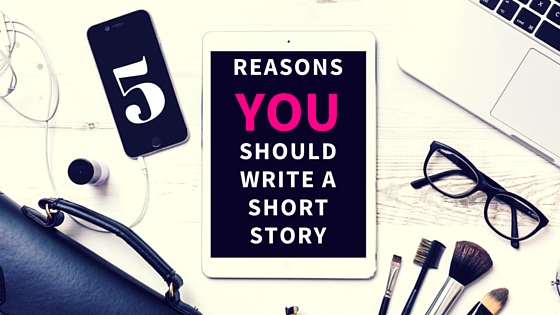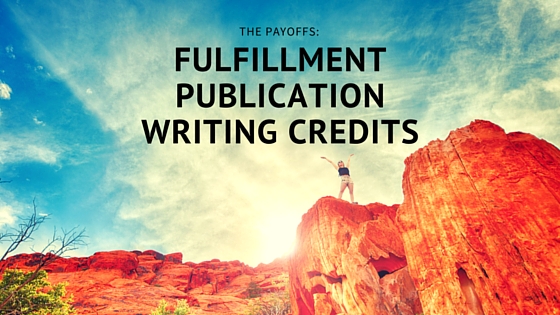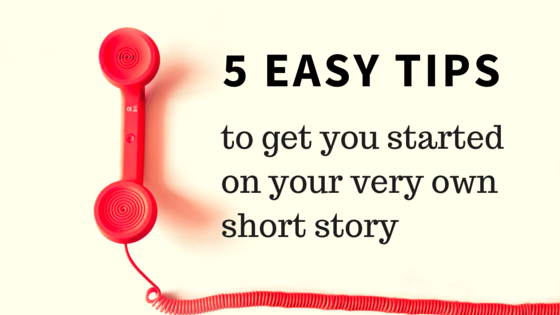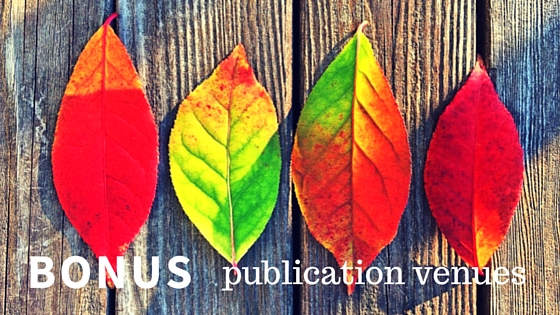5 Reasons You Should Write a Short Story (And 5 Easy Tips to Get You Started)

Writing a short story is like baking a perfect tray of brownies and then sharing it with both friends and strangers. Whereas writing a novel is like being pregnant for nine months, and then realizing you have to raise the kid too.
Even if you only consider yourself a novelist, here are five reasons you should write a short story, followed by five easy tips to get you started.
1. Small Commitment with Big Pay Offs
Most of the short stories I’ve written have taken me somewhere between seven and ten hours (including multiple drafts). You can draft a short story in a few days, give it to readers, and then revise. And then you’re done.

The first pay-off is the sense of fulfillment. You’ve got a finished product, baby! Woot.
And then, after you bask for a few minutes, you can start finding your story the right home. There are tons of places publishing short stories (more on finding them at the end of this post). Getting someone else to publish your story means you have an instant audience of dozens, hundreds, maybe even thousands of people who you don’t know who will read and enjoy your story. Which is pretty awesome.
The final pay-off? You’ve got writing credits. It’s a great thing to put in a query letter—an agent knows that someone else has found your work worth publishing. They’re going to think it’s likely you have more than one story in you, and probably more than one novel – and agents want writers they can nurture for an entire writing career. Having published a few short stories may make the agent give you extra consideration—which could be enough to make the difference.
2. Low Sunk Costs
If you can’t find a place to publish your short story, you didn’t sink much time on it. And now you have awesome content to put on your website or blog. Some authors even write short stories with the planned purpose of putting them on their website (like Erin Morgenstern of Night Circus fame who posted 261 short stories on her blog over a six-year period).
You can also save your short stories for a future short story collection.
3. Beating Writer’s Block
Writing a short story can keep you fresh and help kickstart your other writing. If I have really wretched writer’s block on my novel I have two options: 1. I can be miserable and hope it will go away, or 2. I can switch to another project and keep my writing juices flowing. Switching to a new novel is a bad idea for me, because it’s a huge task and I might never finish the first project. A short story won’t take me away for long, and when I go back to my novel I always have new ideas on what to write or how to revise.
4. Experimentation
A short story is a great place to experiment with new techniques. Have you always wanted to write a story using the epistolary form or write a horror story? Want to try out first person present or doughnut omniscient? (Yes, it’s a real thing.) Then do it in a short story. It might be disastrous, and if so you’ve spent a few hours learning something. But your short story also might be amazing.
5. Entire Writing Process in a Nutshell
When you write a short story, you can go through the entire process of storytelling in a short time, from the inception of an idea to the editing to the publication and promotion of it. You can also really focus on crafting and polishing words and sentences.
With a short story, I can often read the entire piece at my writing group and receive instant feedback on the big picture things as well as smaller concerns. The skills I have learned in writing short stories have transferred over to my longer works.
Because it’s in a smaller form, short story writing is a great way to figure out and refine your personal writing process.
5 Easy Tips to Get You Started On Your Very Own Short Story

1. Stick to the Cool Idea, Image, or Moment
For a short story, you often only need one cool idea, image, or moment. And then you turn that into a scene. That might end up being the only scene in your story, the first scene, or the last scene. If you need more than one scene, only build those necessary to develop the essential idea, image, or moment.
Develop your characters with a few essential, distinct details and a wisp of back story that implies something more. Do the same with the setting—a few amazing details imply an entire world. Even for a fantasy/science fiction story, I often don’t even worry about figuring out the rest of the world myself—doing so tempts me to make the story too long, and the reader can fill in the details herself.
Often people will read my short stories and tell me, “That is such a cool idea. Why don’t you turn it into a novel?” And a lot of my stories could be developed further, could be turned into novels. For example, Orson Scott Card’s novel Ender’s Game was originally written and published as a short story.
But the key when writing a short story is to not let yourself expand it into a novel (at least not for now). If you have a beautiful or moving or insightful or funny idea or moment, it can be powerful on its own—sometimes more powerful and poignant than in a longer form. And no writer has the capacity to turn every cool idea into a full-fledged novel. In that path lies madness…
Length:
A small version of a short story is the flash fiction story. Most definitions cap the flash fiction story at 1000-1500 words, though there are smaller versions (for example, the 6 word, 50 word, and 100 word story).
A short story typically goes up to around 7000 or 7500 words, though if you’re starting out I’d recommend shooting for 2000-3000 words maximum.
It can be extremely challenging to keep your story to 1000 or 3000 words, but doing so forces you to distill your ideas to their very best.
2. It Doesn’t Need a Twist, but it Does Need a Turn
Like the novel, a short story needs a beginning, middle, and an end. But it doesn’t always follow the three act structure, and in most cases you don’t have time for a true denouement.
Some people say that short stories need to end with a twist, and while that can be a good ending, you don’t a twist. What you need is a turn.
The turn is actually a common term in poetry, and is also called the volta, the fulcrum, or the swerve. Almost all sonnets end with a turn.
The turn is a transformation, a shift, a moment of revelation or insight. It can be a shift in plot, character, emotion, or tone. And sometimes it’s a twist.
To me, the turn is really about discovery—and it can be a moment of discovery for the character, the reader, or both.
[Read more about turns on Wikipedia, and then when you read short stories or poems, try to find the turn. It’s there waiting for you.]
3. Let Yourself Loose
Don’t worry about getting your ideas perfect during the first draft. Just get your ideas down. If you need to, force yourself to do the first draft as a rush write.
Also, allow yourself to use inventive forms. There’s a subgenre of flash fiction in which stories are told through the form of a list. The story could be told through journal entries, news articles, or a myriad of other possibilities.
4. On Finding Ideas
Don’t have an idea for a short story?
Visit a list of writing prompts (just google “writing prompts” and you’ll find dozens of websites with hundreds of prompts). Choose one that’s interesting, and write a short story.
Take a character from your novel and write a short story for them that occurs before or after. Readers absolutely love this, and it can help you flesh out your characters.
Use a short story contest as a writing prompt.
One great publication is The First Line. Four times a year they solicit short stories in any genre–all you need to do is use their opening sentence.
You can also find short stories submission calls on writingcareer.com and freelancewriting.com.
Please note – with rare exceptions, don’t submit to short story contests which require entry/reading fees. If it’s a 1 or 2 dollar fee to maintain their submission database technology I’ll do it. But if it’s a larger entry fee, most of the time they are using it as a money-maker. There are so many places that don’t require entry fees, and with a few exceptions (i.e. Creative Nonfiction) most of the better publications don’t.
If your story isn’t accepted by the contest or publication, you may very well be able to find another place to publish it. (More on that below.)
5. Read Short Stories in Your Genre
My short story writing improved when I started reading more short stories. Reading helps you internalize the form. You can check out short story collections in every genre at your local library. There are also online short story magazines where you can read a new short story every day. Some, like Daily Science Fiction, will even send it to your email inbox.
En Fin
I believe in novels—in fact, I’m on the sixth draft of a novel right now. But I absolutely love writing short stories and the sense of completion that comes from finishing something quickly, and then sharing it with others and hearing that it has impacted them in some way.
Bonus: Publication Venues

Publishing is about finding the right match for your story, where your story matches their vision for the publication. There are some magazines (both online and print) that pay professional rates (6 to 10 cents per word). I will often submit a short story to one or two big places with pro rates, and then I’ll submit to smaller publications, sometimes with token payment or unpaid. I know I’m not going to become rich from writing short stories, so it’s more about finding a good home for my short story and getting it to readers.
A few notes:
Most publication venues for short story will purchase (or request) first time publication rights, exclusive for one year. And after the year is up, you can republish the story whenever and wherever you’d like.
Most short story magazines (online or in print) don’t allow simultaneous submissions. And I’ve had it take up to a year to hear to back. But don’t be dismayed! After a couple months, you can always query about your submission, and if they don’t reply, you can withdraw.
Unlike a novel query level, if a short story magazine requests a cover letter, they normally want it to be extremely concise. (Here’s a great article on the short story cover letter.) Of course, read the specific guidelines for wherever you’re submit and try to match that.
Flash Fiction
- General: Every Day Fiction; Flash Fiction Online; Splickety Prime
- Science fiction and fantasy: Daily Science Fiction; Fantasy Scroll; Escape Pod; 365 Tomorrows; Flash Fiction Online; Havok; Leading Edge Magazine (published by BYU)
- Romance: Splickety Love; Romance Flash
- More magazines lists: Flash fiction list and Flash fiction index
Short Stories
- There are dozens of paying and non-paying publications in every genre. Some Google searching and sleuthing is required.
- Poets and Writers has a great list of literary magazines (sortable by genre)
- writingcareer.com and freelancewriting.com post listings for short story contests.
- ralan.com has listings for speculative fiction, mystery, horror, and humor
- The book Novel & Short Story Writer’s Market (check your library for it)
- Science Fiction & Fantasy Writers of America has a list of professional markets in the genre (scroll to “Magazines and Short Fiction Venues” section).
- Many communities have local writing contests, like the annual Tempe Community Writing contest (open to Maricopa County, Arizona) or story contests in college alumni magazines. These are a great place to get your foot in the door.
Note: You can read or find links to most of my short stories on my Short Publications page.
This originally appeared as a guest blog post on ANWA Events.

This is one of the significant pieces of information! This is one of the great lists, and I will bookmark your blog and share this with my friends. Thanks a lot for sharing your wonderful page.
Thank you for putting this out there. I agree with your opinion and I hope more people would come to agree with this as well.